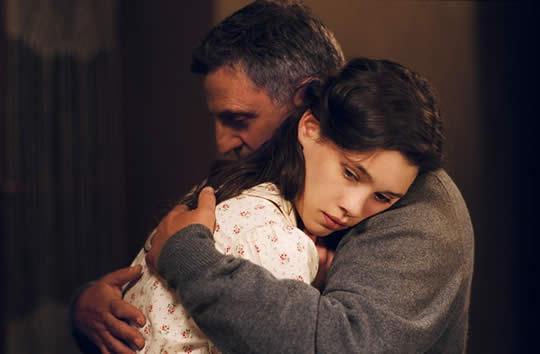 Actor Daniel Auteuil makes his directing debut with this warmly satisfying remake of Marcel Pagnol’s “The Well-Digger’s Daughter”.
Actor Daniel Auteuil makes his directing debut with this warmly satisfying remake of Marcel Pagnol’s “The Well-Digger’s Daughter”.
As in Pagnol’s exceptional films, Auteuil captures the social snobberies and class divisions in provincial France, during the first half of the 20th century.
Richly conceived, full of emotional gesture and nuance, Auteuil sets the perceptive social drama in dry, sun burnished Provence.
It’s the eve of the First World War, the last days of summer and the last days of peace. Following the death of her mother, lovely Patricia (Astrid Berges-Frisbey), daughter of stolid welldigger Pascal (Auteuil) returns from her adopted Paris home to care for her young sisters.
Practical peasant Pascal thanks heaven every day for Patricia, the angelic daughter who’s rescued his motherless brood. With too many mouths to feed, Patricia was “adopted ” by a doting motherless guardian, and raised as a gentlewoman in a convent near Paris.
When first we spy her, she’s traipsing through the glorious summer fields, with a lunch basket for Pascal and his assistant Félipe Rambert (Kad Merad-“Les Choristes “). While stripping off her shoes to ford the stream, she’s rescued by handsome Jacques Mazel (Nicolas Duvauchelle’ “White Material, “The Girl On the Train), a seeming lay about lazing ion the bank.
As he carries her across the river, she blushes, moved by his manly charms. After delivering the lunch, she rushes off, eager to see the troubling young man again. Jacques is the celebrated son of the towns most prominent shopkeeper M Mazel (Jean-Pierre Darroussin) and his snobbish wife Mme Mazel (Sabine Azéma.)
Meanwhile, urged by Félipe, Pascal determines to keep his angel close by marrying her to his unschooled assistant, if she will have him. To Pascal’s surprise, Félipe has a house, substantial savings, and a car.
At home, the family connives to surprise the elegant city bred Patricia with a birthday hat straight from the local “Hats Of Paris” shoppe, the height of local fashion. Pascal is sure that a desire to be seen in her new hat will be all the excuse Félipe will need to invite Patricia, by car, to the local air show.
Amanda (Emilie Cazenave) the next oldest loves Félipe. Realizing he’s not for Patricia, she asks her to delay turning down his proposal. She needs time to get a little older and catch his eye. Unwilling to lead sweet Félipe on, Patricia turns him down, until she discovers that his air corps buddy Jacques will be performing air stunts. Unable to resist, she goes to town with Félipe.
Felipe can’t imagine his luck; to be seen squiring the exquisite, ladylike Patricia! There’s a delightful shot of the two bumping along in his flivver, each in their Sunday best. It’s easy for practiced Jacques to gull Félipe and lead Patricia astray. Concocting an alibi he teaches tempted, virginal Patricia to lie. Patient Félipe waits in the square while Patricia visits her estranged “aunt”.
She comes to her senses and leaves his pied a terre, virginity intact, but fate and the weather collude and before the day is out, she’s given “everything ” to her suave beau. Even drunken clueless Félipe is drawn into the charade.
Shaken that he’s actually taken her virginity, Jacques promises to meet her in the morning by the chapel. His commanding officer arrives that night and he’s called up. There’s no time to meet Patricai and explain. He makes his possessive , doting mother promise to deliver his letter. Patricia waits by the chapel. Mme Mazel gets aone look at the poor well diggers daughter and burns his letter. As in Pagnol’s “Fanny and Marius”, Jacques leaves without knowing the result of their act of passion.
Pagnol’s delightful original tooks risks with the then topical subject of unwed mothers. Auteuil doesn’t have that historical edge, and must make enduring human foibles carry the weight of the story.
When Patricia confesses, Proud Pascal dresses Patricia and his brood in the sunday best and goes calling on the Mazels, determined to give them a chance to do right by his daughter.The scene is a marvel of pride, peasant logic, and regional traditions of the day. When they refuse and shame him, tradition bound Pascal sends beloves Patricia away to live with his equally trangressive sister Nathalie where no-one will know her, and no sheme will come to his other daughters .
Big-hearted Félipe offers to raise Patricia’s bastard, but she refuse him and he leaves for the front. The last act follows the various steps in the reunification of the two families. There are no plot surprises, but delicious scripting and artful playing by Auteuil and Darroussin make their scenes memorable.
Pascal’s visit to Patricia, his grandchild, and his plucky sister Nathalie (Marie-Anne Chazel) builds another subtle crescendo of nuanced interaction. Blind to himself, the two women play on his grandfatherly ego , and before he knows it his happily taken his errant daughter, and Amoretti grandson home, Named for his mother ( In the old tradition ) he proudly shows off his grandson to all and sundry.
Super star Auteuil’s International career was launched by his performances in two earlier Pagnol adaptations, “Jean De Florette” and “Manon Des Sources.” Using an Italo-provincial accent, Auteuil turns in a performance worthy of Spencer Tracy. Spanish/French/American actress Bergès-Frisbey manages the impossible, creating a delicate canny innocent and and making us care in this jaded day and age. Sabine Azéma (“Wild Grass”) is skillful as the deceitful doting mother who almost loses everything out of midplaced pride.
Alexandre Desplat’s classic orchestral score wraps around popular french songs of the period. Jean-François Robin’s cinematography of the verdent Alpilles area (near Eygalières ) seduces without settling for easy postcard prettyness. Pierre-Yves Gayraud’s amusing

